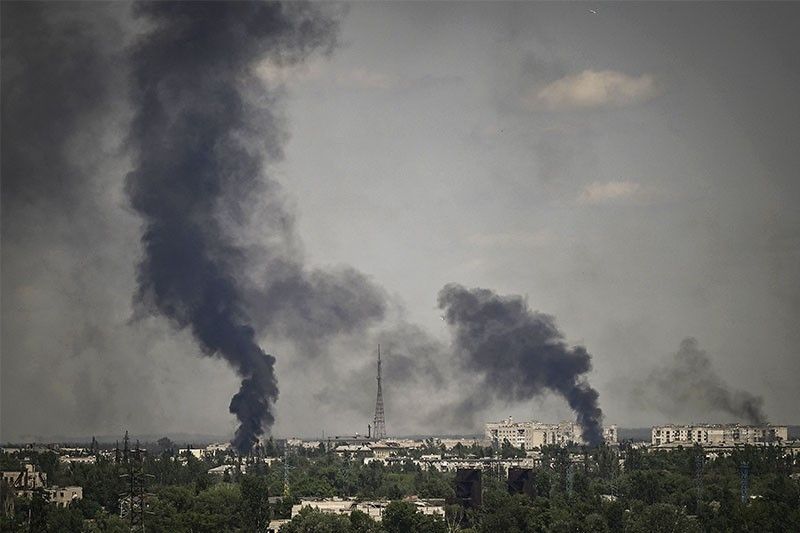Russians advance on Severodonetsk as US boosts weapons to Ukraine

SOLEDAR, Ukraine — Russian forces edged closer Wednesday to taking the key eastern Ukraine city of Severodonetsk but Kyiv's hopes of holding off their invaders were boosted by a US pledge of more advanced rocket systems to help their defence.
The Russians had taken control of 70 percent of the key industrial hub, with Ukrainian forces withdrawing to prepared positions, Lugansk region governor Sergiy Gaiday said.
"If in two or three days, the Russians take control of Severodonetsk, they will install artillery and mortars and will bombard more intensely Lysychansk," the Ukrainian-held city across the river, he said on Telegram.
Ukraine successfully stopped Russia from seizing Kyiv after its February 24 invasion but the campaign in the east has had a high cost, with President Volodymyr Zelensky saying that 60 to 100 soldiers were dying each day.
"The situation in the east is very difficult," Zelensky told US newsgroup Newsmax.
With only Lysychansk remaining a pocket of resistance in the eastern Lugansk region, Severodonetsk has become a target of massive Russian firepower.
Oleksander Motuzianyk, spokesman for Ukraine's defence ministry, said there was fighting in the streets in Severodonetsk and the Russians had reached the city centre.
"The Ukrainian armed forces are actively resisting them," he said.
In a boost for the outgunned Ukrainian military, President Joe Biden confirmed that longer-range weapons were on the way.
The new weapon is the Himars multiple launch rocket system, or MLRS, a mobile unit that can simultaneously launch multiple precision-guided missiles up to 80 kilometres (50 miles) away.
They are the centrepiece of a $700 million package unveiled Wednesday that also includes air-surveillance radar, more Javelin short-range anti-tank rockets, artillery ammunition, helicopters, vehicles and spare parts.
'Fuel to the fire'
Kremlin spokesman Dmitry Peskov accused Washington of "adding fuel to the fire", saying that the weapons would not encourage Kyiv to resume peace talks.
US Secretary of State Antony Blinken said that Ukraine had promised not to strike into Russia — and dismissed suggestions that Washington was to blame for escalating with Russian President Vladimir Putin.
"Simply put, the best way to avoid escalation is for Russia to stop the aggression and the war that it started," Blinken told reporters.
He promised that the United States would keep assisting Ukraine, saying there were no signs of Russia pulling back.
"As best we can assess right now, we are still looking at many months of conflict," he said.
While some analysts have suggested the Himars could be a "game-changer", others caution they should not be expected to suddenly turn the tables, not least because Ukrainian troops need time to learn how to use them effectively.
But they may improve morale after 98 days of war.
"If you know you have a heavy weapon behind you, everyone's spirits rise," one Ukrainian fighter on the frontline told AFP before the announcement.
'Negative consequences'
Elsewhere, a missile struck transportation infrastructure near the comparatively stable western city of Lviv, injuring two people, regional governor Maksym Kozytsky said.
West of Severodonetsk, in the city of Sloviansk, AFP journalists saw buildings destroyed by a rocket attack in which three people died and six others were hurt.
And on Wednesday, at least one person died and two others were injured in Soledar, between Sloviansk and Severodonetsk, AFP saw.
The European Union has also sent weapons and cash for Ukraine, while levelling unprecedented economic sanctions on Moscow.
Germany said Wednesday it would deliver an air defence system capable of shielding a major city from Russian air raids, although it will take months to get to the frontline.
EU leaders agreed this week to ban most Russian oil imports but played down the prospects of shutting off Russian gas on which many member states are hugely dependent.
Moscow said a "reorientation" was under way to find alternative destinations for its oil, as it moved to "minimise the negative consequences".
The sanctions are biting — a panel of investors said Wednesday Russia has failed to pay $1.9 million of accrued interest on a sovereign bond.
And Russian energy giant Gazprom said its gas exports to countries outside the former Soviet Union dropped by more than a quarter year-on-year between January and May after losing several European clients.
Denmark joins EU defence
Russia's invasion of Ukraine has sparked a rethinking of security for many Europeans, with Finland and Sweden shedding earlier reluctance to join NATO.
Denmark, a founding member of NATO, took a step further Wednesday by voting overwhelmingly to join the European Union's common defense policy.
"Tonight Denmark has sent a very important signal. To our allies in Europe and NATO, and to Putin," Danish Prime Minister Mette Frederiksen told cheering supporters.
"We're showing that when Putin invades a free country and threatens the stability in Europe, we others pull together," she said.
Russia's invasion has killed thousands of people and sent millions of Ukrainians fleeing, but also risks triggering a global food crisis.
Ukraine — one of the world's main producers — will likely export only half the amount of grain that it did in the previous season, the Ukrainian Grain Association said.
At the Vatican, Pope Francis pleaded against the use of grain as a "weapon of war".
And in Glasgow, meanwhile, Ukraine's national side played its first official match since Russia's invasion, defeating Scotland 3-1, setting up a World Cup play-off decider against Wales.
Reflecting the views of many, army serviceman Andriy Veres, 44, said he had been hoping for victory.
"These days it is very important for the country, for all people, for all those who are fans and even for those who are not," he told AFP in Kyiv.
- Latest
- Trending



































